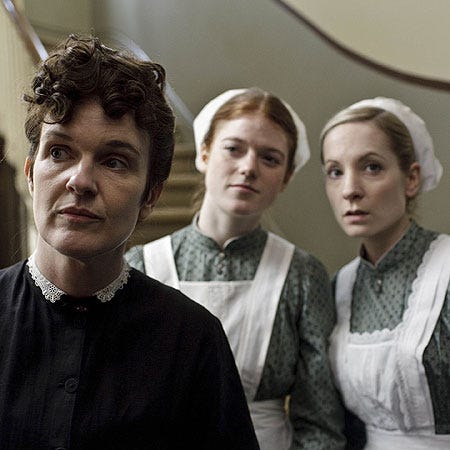Notes from the edge of civilization: October 26, 2025
Rome. Rome. And more Rome. Three signs we're living through the fall of empire: art heists, housekeepers, and — Oh SNAP! — hunger.
Across France, priceless jewels, porcelain, and gold coins have been stolen in recent weeks: is this the modern equivalent of ancient cities getting sacked?
People love to make comparisons between the times we’re living through and the fall of Rome. Except this time the barbarians aren’t at the gates. They’re inside museums while cameras point the wrong way and the alarm systems are off because of cyber-attacks. Jerry Seinfeld called it decades ago: all you need to figure out is how to get past the folding chair and the thermos of coffee!
To recap quickly, per a story in the BBC:
€88 million in royal jewels taken from the Louvre in broad daylight.
2,000 gold and silver coins lifted from a museum dedicated to French philosopher Denis Diderot the same night.
A Natural History Museum was hit by thieves who knew the alarms were down and made off with six gold nuggets.
Millions worth of Chinese porcelain pilfered from a national museum in Limoges.
France once plundered half the world for art and gold; now it can’t stop criminals armed with power tools, smart phones, and a ladder.
So please forgive us for using the worn-out old chestnut: this is probably what it looked like when Rome fell. The Visigoths didn’t just grab gold and silver — they looted meaning. They destroyed Rome’s self-image, its aura of invincibility, and the illusion that Pax Romana was eternal. The empire’s elites were made shockingly aware that they weren’t so special and that their walls and fortresses were just like any other. Once the gates were breached, the scales must have fallen from their eyes: they were just a bunch of rich people surrounded by hungrier hordes.
Another sign we’re living through the fall of Rome came via a Bloomberg story this week:
As the wealthy get wealthier and fuel a boom in luxury furnishings, highly trained household staff are in high demand.
In ancient Rome, the elites didn’t just have slaves — they had specialized slaves. One polished bronze, another tended ivory inlays. Wealthy matrons kept slaves who were taught to manage fabrics, furniture, and even scroll libraries. These urban household staff were known as the familia urbana (as opposed to the familia rustica who toiled on rural estates).
Fast forward 2000 years: a man in Toronto is now charging $6,000 for a five-week course to train “private service professionals.” Charles MacPherson started the business after managing the household staff for one of Canada’s most prominent families. “Cleaning correctly is actually a skill that has to be taught and learned, and it’s actually a serious job,” he says.
Once upon a time, being in domestic service was the kind of work you took when all other avenues were closed. Now, as the average college grad drowns in debt and is lucky to clear $55,000 per year to answer emails for some mid-tier consultancy, an “executive housekeeper” can pull down $120,000 annually to expertly wipe fingerprints off a coffee table that costs more than a Ferrari.
In the past, value came from what could be produced. In the modern economy, it comes from what can be preserved. The rich don’t just own things — they curate entire ecosystems of trained handlers to maintain them. And because they’ve cornered so much of the world’s capital, even dusting their possessions has become a six-figure profession.
Turns out Downton Abbey was predictive programming all along.
For centuries, the Roman empire kept the peace by feeding and distracting its people. Every month, free grain, known as the annona, arrived from Egypt and North Africa, and citizens lined up for their share. Gladiator fights, chariot races, and public feasts kept them loyal. As Juvenal put it, the people “longed for two things only — bread and circuses.”
When that stopped, the social contract collapsed.
Inflation devoured the currency, grain fleets stopped arriving as trade routes fell to pirates and invading armies, and public games were abandoned. With no bread and no circus, the crowds dispersed. Rome’s population fell from over a million to tens of thousands.
When the empire could no longer feed its own citizens, it lost the illusion that it was still in control.
This week, we could see what happens when the same story plays out in a modern context. As NPR (eye roll!) reports:
In just over a week, nearly 42 million people in the U.S. who get federal food assistance are in danger of seeing their benefits disappear because of the ongoing federal shutdown.
About 1 in 8 U.S. residents get an average of $187 a month through the Supplemental Nutrition Assistance Program, or SNAP.
Don’t kid yourself: SNAP is the modern-day annona, digital grain credits uploaded to a plastic card. Rome’s grain dole ran on ships and coinage; ours runs on databases and debt. Both systems were built to preserve calm through consumption. When they break, hunger sets in along with panic, anger, and the realization that the empire never had a backup plan. Or cared, really.
On November 2, the most ‘advanced’ civilization on earth may replay the oldest story there is: when bread disappears, you can’t eat circuses.





Such an interesting parallel with the end of the Roman Empire. The evidence of Bones etc , suggests that for many this end meant improvements in health. This is because the peasants stopped eating grain , the currency of Rome and returned to farming and eating more protein.
I can’t see that happening in America , as has been said before we are only 9 meals away from anarchy ….
Wrt SNAP, and the Roman Empire, my wife had been pressuring me for years to apply for SNAP, but my pride kept me from doing so. But in 2014, age 41, I lost the only decent “middle class” job I was ever going to have again. If we had remained in the US, certainly we’d still be on SNAP today, and for the rest of my working years.
Instead, taking a cue from world history (Roman Empire, British Empire), I reasoned that sometimes, **sometimes**, not typically but sometimes life is better (for us non-millionaire workin’ stiffs) on the periphery of a great empire than back home in the motherland. So, in 2015 I suggested to my wife that we move the family (5 kids) to her native Tokyo-metro to take a chance on self-employment.
So far, so good; maybe even all’s well that ends well.
In conclusion, yes I agree with the author(s): the US Empire is hollowed out back home in the motherland. It’s a deck of cards built upon a foundation of sand. It’s ready for the slowly-then-all-at-once.
That said, in just nine months Trump has already shored up the US Empire abroad, beyond anyone’s expectations, plus there’s every indication that his foreign policy will continue to beat back the US ‘Uniparty’ + Euro monarchy’s trans-Atlantic Great Reset conspiracy 👍🙂
A strong US Empire will keep the bread & circuses coming to the US citizenry, despite the hollowed out working man’s institutions (from infrastructure to healthcare & education & everything else).
Meanwhile, here on the periphery, I have even more hope, today, for my sons’ future marriage & employment prospects in Japan than I did 10 years ago in 2015.
… The Japanese working man’s world is not hollowed out. Despite 40 years of decline, Japan is still more functional today (infrastructure & institutions) than my USA was 40 years ago in 1985 (!!!) … Crossing my fingers that when Great Depression 2.0 hits us that Japan will handle it better than the motherland.